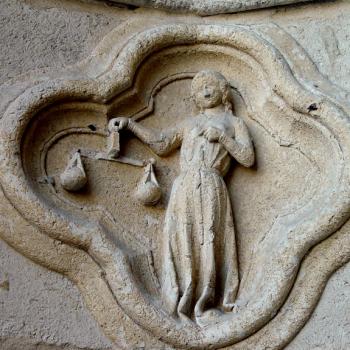
Selfishness encourages us to seek our own private gain at the expense of others. It will encourage us to do things for own immediate gratification, and, because we find some initial satisfaction when we attain that gratification, it might seem our actions are justified. However, whatever pleasure we receive will only be temporary, and once it is gone, we will find ourselves in a worse position than we were before we acted, for our selfishness will have had us become so attached to ourselves we cut ourselves off from everyone and everything outside ourselves, including and especially God, the source and foundation of every good. We will slowly find ourselves becoming more and more isolated, until we find ourselves becoming so cut off from everything, all we experience can only be said to be our own private hell, the hell of our own making:
If we, while on earth, continue to make choices based on selfishness, rather than self-sacrificing love, we will enter into a state of isolation, that destroys God’s true life shared through authentic love for others. Hell is most real, but it is found in our hearts and not in some “place” below the earth. From God’s side, He can never go against His nature, which is always to love us actively. Yet, from our human side, we can continuously make choices that separate us from God and the rest of His created world.[1]
Hell is a state of our own creation, not something intended for us or willed for us by God. God’s will for us, and for all creation, is to have everything drawn together and be one. Then, in and through that unity, they are called to be united with God and participate in the divine life itself. This is why Jesus tells us we are to be one like God is one, for he wants us to overcome all that separates us from God and from each other so that we can attain the goal God intended for us.
God does not compel us with force. God does not undermine our will. Rather, God encourages us with all that God does, especially in and through the incarnation and the revelation of divine love which is given to us through it. God hopes we will break down all the barriers which we have and could put between us and all others, and between us and divine love, so that we can truly thrive. God warns us that if we do not, we will be the cause our own suffering as we will cut ourselves off from all that which could and would bring us satisfaction and peace.
This is why self-love, when it is understood as an egotistical, selfish love, is said to be deceitful by Vladimir Solovyov. If we listen to it and what it suggests, it tells us that we should satisfy all our desires, no matter how base they are, because what it promises is heaven but what it should lead us to is the state of hell:
Self-love is the father of all deceit, its cunning sophistries beguile our understanding and lead to two disasters: it weakens man’s will in the fight with temptation, and it hands his soul over in advance to all kinds of iniquity. The unscrupulously selfish man does not merely spoil himself morally by committing such and such sins from time to time; he is completely deprived of stability and moral balance and his whole life is one long sin; he is inevitably unjust in his dealings with others and his personal desires are endless. [2]
The only one who can satisfy infinite desires is God. Selfishness will have us deny our relationship with God, to detach ourselves from God and only engage and satisfy our own ego. If we do so completely, we will be left only with ourselves, and the limited potentiality we have, a potentiality which will not be able to fulfilling our never-ending desires in eternity; we will find ourselves becoming more and more dissatisfied with what we have, and through that dissatisfaction, we will even find ourselves becoming pained by what we lack, a pain which will also grow in eternity. This is what the state of hell entails. On the other hand, if we detach ourselves from ourselves, and open ourselves up to union with God by proper self-denial (which is not to be confused with some nihilistic hate for ourselves), we will find that God will fulfil our every desire, making sure that eternity is one of continuous growth in peace and joy because we are open to and united to the unlimited potential found in the divine life itself.
This is why it is important to understand hell, and even heaven, to be states of being more than mere places, and why, because they are states, we can have a foretaste of each in our present life. We can have some hellish experience during our temporal existence, and because we have, we can reconsider our lives and change them so we do not have to suffer the state of hell for eternity. Others experience a foretaste of the kingdom of God, such as St. Paul when he talked about his experience of the “third heaven” (cf. 2 Cor. 12:2-4).
When we understand we can and likely will experience elements of both heaven and hell in our temporal life, we will begin to understand better how we could end up experiencing either in eternity; if we pay careful attention, we can learn from the experiences, let them shape and direct us so we do not end up becoming so self-attached, we cut ourselves off from eternal beatitude. We will embrace love as it is love which helps us die to the self without nihilism, that is, it is love which has us open to receive what others, including and especially God, can and will provide to us When we do that, we will begin to have a new understanding and appreciation for creation itself, for, as Bulgakov says, love gives us the vision and understanding which we need:
Only love gives wisdom, only love gives vision, only love gives forgiveness. The one who loves receives the ability to look upon another as the other sees himself. We are divided from one another by self-love, self-concern, and self-interest. Our gaze is obscured by the partiality of our judgment and vision; we always, when thinking of another, think of ourselves, of our own feelings but not of the other and his feelings. We must feel what the other feels, and then our eyes will be opened. Through the experience of love one receives this experience of wisdom, the knowledge of the other, of one’s neighbor, of one’s friend. [3]
Selfishness, self-attachment, that is, self-love which is love for ourselves all alone, will never give us that vision, and so never will provide us the path to beatitude. All it offers is a limited good, one which might at first satisfy, but it will not satisfy for long, and once that satisfaction is gone, all we will have is ourselves; we will then be so full of desires which will never be met, they will only bring us pain and sorrow.
[1] George A. Maloney, SJ, Communion of Saints (Hauppauge, NY: Living Flame Press, 1988), 169.
[2] Vladimir Solovyey, God, Man & The Church. The Spiritual Foundations Of Life. Trans. Donald Attwater (Cambridge: James Clarke & Co., 2016), 29.
[3] Sergius Bulgakov. Spiritual Diary. Trans. Mark Roosien and Roberto J. De La Noval (Brooklyn, NY: Angelico Press, 2022), 148-9 [8/21.V.1925].
Stay in touch! Like A Little Bit of Nothing on Facebook.
If you liked what you read, please consider sharing it with your friends and family!
N.B.: While I read comments to moderate them, I rarely respond to them. If I don’t respond to your comment directly, don’t assume I am unthankful for it. I appreciate it. But I want readers to feel free to ask questions, and hopefully, dialogue with each other. I have shared what I wanted to say, though some responses will get a brief reply by me, or, if I find it interesting and something I can engage fully, as the foundation for another post. I have had many posts inspired or improved upon thanks to my readers.












